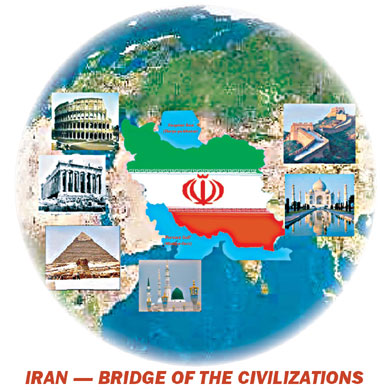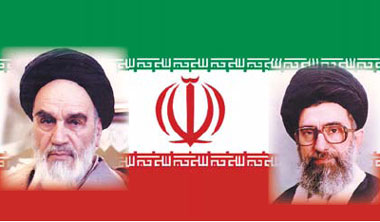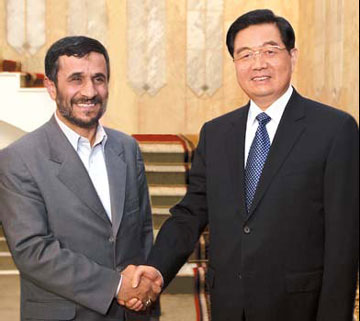Sino-Iranian ties witness steady growth
From about 2,000 years ago, through the heights of the Tang Dynasty (618-907), the Silk Road has played a unique role in foreign trade, cultural exchange and political relations stretching far beyond the boundaries of Asia. It has left its mark on the development of civilization on both sides of the continent.
|
Left: Imam Khomeini, the Great Leader of the Islamic Revolution of Iran. Right: Ayatollah Ali Khamenei, the Leader of the Islamic Republic of Iran. |
The Silk Road has been the symbol of the warm relationships in the course of this long history. As the heir of the Silk Road, Iran as an influential country in the west of Asia and China as an important country in the east of the continent, have continued to foster friendly relations in different fields.
Iran and China established diplomatic relations on August 16, 1971.
In keeping with the goals envisaged in the Twenty-Year Outlook and Fifth Five-Year Development Plan of Iran, the government of the Islamic Republic of Iran would like to promote long-term cooperation with China.
The two great countries of Iran and China have been cradles of great civilizations and both have contributed greatly to the advancement of civilization in Asia and the world.
Exchanges in several fields form the mainstay of interactions between the two countries.
Both countries have pledged to make further efforts to develop relations and cooperation, noting that good ties between the two great nations will lead to remarkable achievements in the political, economic, cultural and social fields for not only Iran and China, but also for the region, thus contributing to world peace and stability.
Iranian President Mahmoud Ahmadinejad pays particular attention to bilateral relations, as well as regional and international cooperation between Iran and China. Iran would like to increase cooperation with China in all aspects.
Shared views
The government of Iran, like the leaders of China, reiterates the importance of justice, clemency and friendship in international relations, and believes that equal status of states in the world community does not allow any country to exploit, intimidate or dictate policies to other states on the basis of unilateral practices improvised by any such state.
|
Chinese President Hu Jintao meets with Iranian President Mahmoud Ahmadinejad on August 16, 2007 in Bishkek. |
Both sides believe that if relations between states are not based on justice and internationally recognized norms and rules, not only the poor and weak, but also the developing countries of the world community will suffer, because injustice can be the root cause of many challenges facing our present world such as poverty, violence, terrorism, and conflict, whose destructive consequences will escalate beyond national borders and affect all parts of the globe.
Consistent with its Look East Policy and for the purpose of having greater and more active presence in regional arrangements, Iran managed to acquire observer status in the Shanghai Cooperation Organization (SCO), which involves constant consultation and cooperation with China.
The summit meetings of heads of states and heads of governments of Member and Observer countries of SCO provide a good opportunity for the leaders to exchange views on different matters.
In this regard, the meeting between the presidents of Iran and China on August 16, 2007 in Bishkek was positive and constructive.
Iran and China have enjoyed a warming of political relations in recent years.
The two countries have seen greater exchange of political delegations, visits by high-ranking political leaders like the former presidents of both countries and the holding of 12 meetings of the Joint Economic Commission, in keeping with the goals envisaged in the Twenty-Year Outlook of Iran.
The foreign minister of China paid an official visit to Iran last November, while the ministers of health and interior and the top nuclear negotiator of Iran also visited China last year.
Energy Ties
The Iranian former oil minister visited China in June 2006 to boost energy ties with China. Iran is China's third biggest oil supplier, contributing 13 percent of its oil imports.
Iran and China signed various memorandums of understanding and contracts for long-term cooperation in oil and gas, and petrochemicals. The energy sector is expected to play a major role in strengthening bilateral trade relations.
The government of Iran wants to expand its energy capacity and will therefore invest about $150 billion in the next 10 years.
Many European and Asian companies have shown interest in reaching energy deals with Iran.
With reference to the importance of energy security for China, Iran can play a key long-term role in this regard.
Iran is keen on long-term cooperation and lasting ties with China.
Iran is interested in sustained economic growth in China because it can boost the regional and world economy and recognizes that China is not a threat for developing countries.
The role of gas in the development of China is very important. Iran is one of the best choices for China, while China is a good option for Iran.
The two economies are complementary and Iran's policy is to push to develop this relation.
Additional to the exploration project in Iran, there are several opportunities for high-standard service companies to prepare exploration services such as: seismic drilling, well-logging and testing.
Many Chinese companies are already involved in exploration services in Iran.
There are many energy fields in which both sides have agreed to cooperate. In December 2007, for example, Iran's National Iranian Oil Company (NIOC) signed an agreement on the development of the Yadavaran oil fields with a Chinese company, a project worth about $2 billion.
The Iranian side, based on the rules of international markets, calls on Chinese companies to invest in energy projects in Iran.
The article is provided by the Iranian Embassy in China

(China Daily 02/18/2008 page13)
















